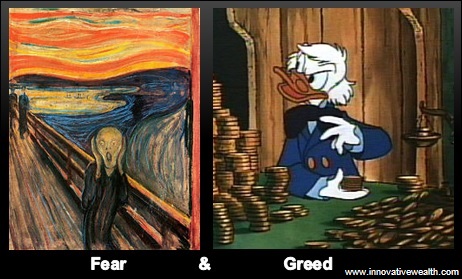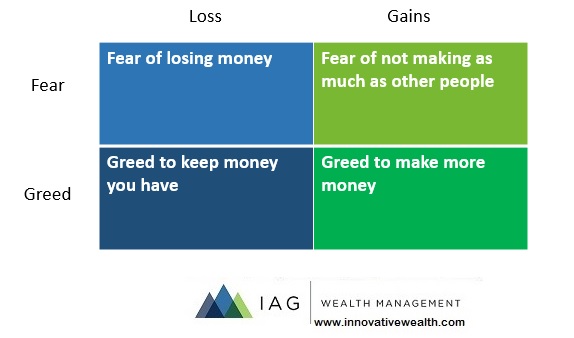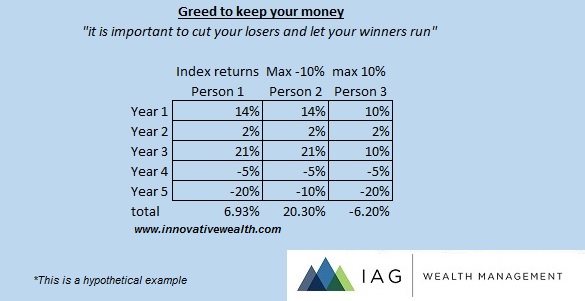
Financial markets are driven by emotions: Fear and Greed
"Master your emotions or they will master you."
Fear is a strong primal and instinctual emotion. Fear has kept our species from getting eaten by saber-tooth tigers and jumping off cliffs trying to fly like a bird.
Greed is also a primal emotion. Greed has forced our species to excel and thrive. It is also the source of conflict when one persons greed overlaps with another's.
While we may like to think we have evolved beyond our primal instincts, our emotions are still very primal. The stock and bond markets which are a major source of wealth in the global economy are primarily driven by these two primal emotions: fear and greed.
Investing is scary and at the same time alluring as a potential source of wealth. Whether you are new to investing or a seasoned veteran, you will constantly battle both emotions. You will also have to learn to cope with this psychological impairment if you want to learn to invest better.
Some of the world's most successful investors have learned certain tricks to cope with these emotions which would impair an otherwise rational investor. In order to become a successful investor, you will need to understand these two emotions and how to harness them in a productive manner.
Fear tends to be the strongest emotion and also the most elusive. Primarily because investors don't understand how it applies to their own investing psychology. Let me elaborate...
Fear: The 2 fears of investing
The emotion of fear when investing can be broken down into 2 sub-categories: Fear of losing money, and fear of under-performing the market (or more commonly known as, the fear of under-performing your friends or FOMO (the fear of missing out)).

Everyone is familiar with the fear of losing money. Whether it is money which was lost by falling out of your pocket, lost at the poker table, or lost by investing in a bad investment, unless you have an endless supply of money, everyone understands this fear.
The second part of fear is often overlooked. I see it every day in people I meet. The second part of fear is FOMO, the fear of missing out, under-performing, or not doing as well as your peers. While this should be rather irrelevant to a rational person, the drive to compete or “fit in” with one’s peers, often overpowers a person’s better judgment. This feeling could also be described as “keeping up with the Joneses.”
This fear causes people to buy big houses (that are much bigger than they need), buy expensive cars (because they can afford the "payment"), buy boats, and other expensive items. This also causes people to buy tech stocks in 2000 because, despite that fact that many of these stocks didn’t make money, you didn’t want to miss out on the opportunity for “easy money”. This also happened in 2005-2008 when the housing boom had peaked, but people kept buying as many homes as they could to take advantage of the housing boom.
While the fear of losing money is natural and important to retain, this second part of fear is extremely hard to overcome. It takes years and persistent hard work to master this fear. The financial media does not help you either. Everyday there is a story about what the market (i.e. everyone else) is doing.
Who cares what everyone else is doing?
Ask Warren Buffett why he lives in Omaha instead of New York City. He has said it in the past, he wants to be as far away from the "noise" as possible so he can think (i.e. come up with his own thoughts, rather than be influenced by others).
While it is hard work to master this fear, it can be done. It is a worthy goal.
Greed: Greed is good... Sometimes
Greed is an easier emotion for most people to understand. It is what drives us as a species to do better. It propels us to achieve great things by wanting more. Greed is not quite as strong an emotion as fear, but it can also make people act in ways they shouldn’t.
Greed can also be separated into 2 sub-categories: greed to make more money, and greed to keep it.
The emotion of greed to make more money is a driving force in the lives of many people, however, it can also cause people to do silly things… Like investing in tech stocks with no business plan, no earnings, and a large number of employees with expensive office space in 1999. Many of these investors knew it would end badly, but they invested anyway. Most people knew it was a bubble and that it would eventually pop, causing large losses. However, these people ignored their better judgment because it was easy to make money as the stock market rose. Of course, they thought they could easily get out before it popped. (i.e. the greater fool theory)
The other side of greed is the greed to keep your money. It is closely related to the fear of losing money. This typically happens to investors when they make 10% in a stock and then sell it only to watch it rise another 30%. Most people don’t understand this part of greed. It can be very detrimental to long-term returns. There is a well-known saying, one which will be one of my future wall street wisdom posts,
“Cut your losers quick and let your winners run”
Unfortunately, what frequently happens to investors, due to this part of greed, is that they cut their winners short and let their losers run. This is the opposite of what you should do and a recipe for poor performance. The table below should exemplify this point.
Fear and greed can affect your performance

In the chart above, the first column shows the returns for investor #1. This investor invests in a hypothetical index and has a buy a hold strategy. They do not sell for any reason. Investor #2 also invests in the hypothetical index, but they have a rule that states they will sell if the index drops -10% in any given year. So if the index drops -20%, this investor only loses -10%. Investor #3 also invests in the same hypothetical index, but they have a rule which states they will sell if the index rises past 10% in any given year. So if the index goes up 30%, they only make 10%.
The performance over 5 years should make the point very clear that you should cut your losses and let your winners run. Investor #2 outperforms their peers by a large margin. It may seem obvious to you looking at this example, but you would be surprised at what people do when real money is involved.
How to conquer your fear and greed
While there are many ways to manage your emotions while investing, this is one trick that could help you invest better.
Limit Your Losses
Yes, it is that simple. Many investors employ the "buy and hope" strategy. They hope the stock will come back. They hope they will not end up losing money. At the end of the day, hope is not a strategy. You need hard concrete rules that keep you out of trouble. The best way to do this is to have a stop loss strategy set up to protect yourself from being wrong.
I’ll clue you in on a Wall Street secret... No one knows where the price of a stock is going on any given day. It is all random noise. Even the smartest investors in the world have no idea where prices are going, but they manage their risk by implementing stop loss strategies to keep the random “noise” of the stock market from losing their hard earned money.
Despite the randomness of the markets, there are a few ways to limit your losses. Here are a few to help you invest better
Stop Losses
One is to use a stop loss on your investments. For example, let’s say you own shares in the ACME buggy whip company. You would create a stop loss order to sell your shares if they dropped more than 10%. This could be a hard stop or a trailing stop. Either way, you would sell your shares if they dropped more than 10%. This limits your losses to -10%.
Hedging your portfolio
Another way to limit your losses is to "Hedge" your position. There are a number of ways to do this, most of which require complex math which has no place here. One more simple example is, some investors do this by buying shares of company A (which makes widgets) and sell shares (short) of company B (which makes widgets). This is what is called a delta neutral trade. it doesn’t matter what the overall market or sector does, you are expecting your trade to move with one company relative to another company.
Options
A third way to limit your losses is to use options. Options were created to limit the risk of owning certain positions. Options operate like insurance. You pay a little money and limit your risk of further losses. Many professional investors use options in this way. As long as you use options the correct way, they are a great tool for limiting your losses.
You are not alone. There are solutions...
Mastering one’s emotions while investing is a hearty challenge, but all top investors have done this. Some have done it through introspection, others have done it through a computer trading system, which is primarily used to remove emotions from decision making, and still, others have done it by hiring an Investment Advisor to make those decisions in order to remove the emotional component. In order to invest successfully, one needs to master these emotions in a way which is suitable for that person.
There is no singular way to accomplish this goal of mastering one’s emotions. Every person is different, and only that person would know which method works best for them to manage their own emotions pertaining to investing. Unless you are one of those uniquely gifted people who can detach their investing from their emotions without years of mastery, the best course of action is to either find an investing/trading system that works for your suitability or find a Financial Advisor to help you remove emotion from your investing.
About Innovative Advisory Group: Innovative Advisory Group, LLC (IAG), an independent Registered Investment Advisory Firm, is bringing innovation to the wealth management industry by combining both traditional and alternative investments. IAG is unique in that they have an extensive understanding of the regulatory and financial considerations involved with alternative investments held in self directed IRAs and other retirement accounts. IAG advises clients on traditional investments, such as stocks, bonds, and mutual funds, as well as advising clients on alternative investments. IAG has a value-oriented approach to investing, which integrates specialized investment experience with extensive resources.
For more information you can visit: Innovative Advisory Group
About the author: Kirk Chisholm is a Wealth Manager and Principal at Innovative Advisory Group. His roles at IAG are co-chair of the Investment Committee and Head of the Traditional Investment Risk Management Group. His background and areas of focus are portfolio management and investment analysis in both the traditional and alternative investment markets. He received a BA degree in Economics from Trinity College in Hartford, CT.
Disclaimer: This article is intended solely for informational purposes only, and in no manner intended to solicit any product or service. The opinions in this article are exculsively of the author(s) and may or may not reflect all those who are employed, either directly or indirectly or affiliated with Innovative Advisory Group, LLC.
